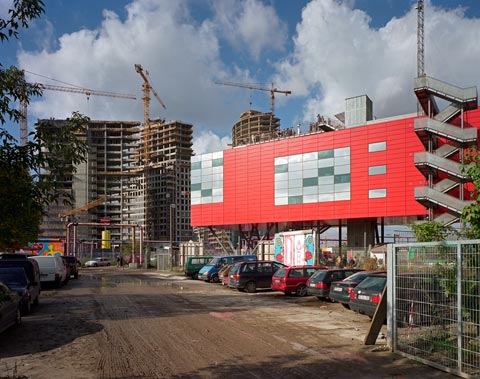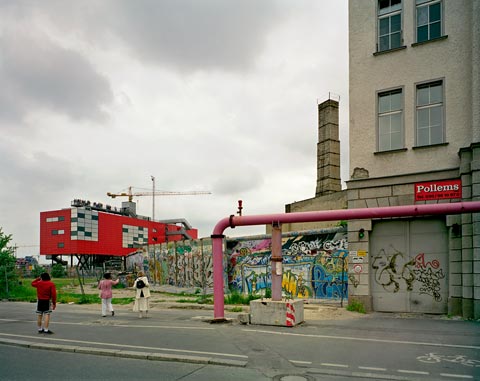
InfoBox and Berlin Wall, 1996 (4×5 film)
In the previous post I compared Potsdamer Platz in Berlin and ground zero (WTC) in New York. Both are historically sensitive places in which rebuilding symbolizes attempts at reclaiming loss. Both entail large commercial development, and both include memorials, either at the heart of the effort as in New York, or nearby as in Berlin. In Berlin the millions of tourists who came to view the vast rebuilding site were welcomed at the InfoBox, a temporary structure housing models, renderings and multimedia presentations, and on the roof, a deck for surveying the new architecture rising on the skyline.
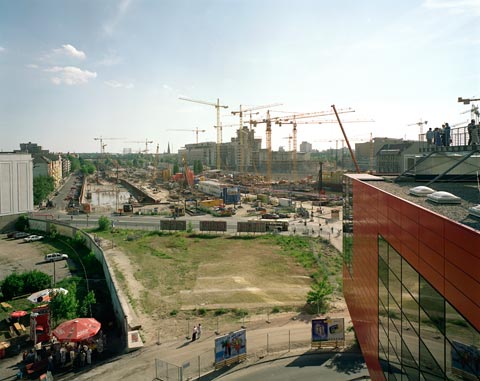
InfoBox and Potsdamer Platz, 1996 (4×5 film)
The InfoBox was designed by Schneider + Schumacher, an architecture firm based in Frankfurt. From their website:
The commission for the InfoBox was the outcome of an invited competition in 1994. The aim was to design a building which would reflect the worldwide interest in the building activities on Potsdamer Platz in the recently re-united Berlin.
The box was concise and easily identified, hovering on stilts above the surrounding chaos, at the time the largest construction site in Europe. It was a simple yet powerful gesture.
In October 1995 the InfoBox opened and in very short time attracted a large audience, welcoming its four millionth visitor in February 1998. In january 2001 this temporary building was disassembled according to plan.
There is no comparable facility in the works for the World Trade Center site. Tourists wander aimlessly trying to grasp the scope of what was and what is to come. There is a small museum, nicely designed, but inadequate to the task. There are photos bolted up high on the metal grating around the Path station–though those are now coming down to make way for the relocation of the station. At the present, most visitors are interested in views into the bathtub, the pit formed by the foundation walls left after the site was cleared of debris that contained the remains of those who died there. There are a few places that afford views: an area under the sidewalk shelter in front of the Deutsche Bank building, which is now being torn down. The pedestrian bridges spanning West Street–very awkward places to stand. The glass wall at the back of the Winter Garden in the World Financial Center–good for an overall vista, but not high enough or close enough to see into the bathtub. That’s basically it.
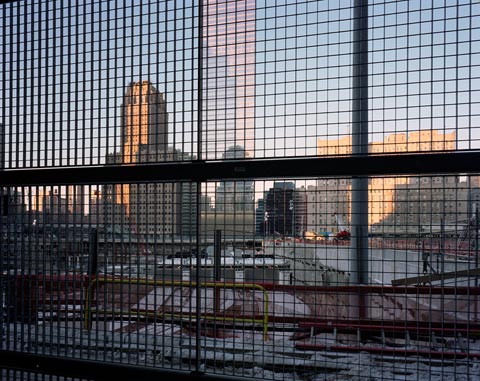
Steel fence in front of Deutche Bank building, (4×5 film)
Ground zero is in great need of an InfoBox of its own, a structure built well above street level with an outdoor viewing promenade. It should contain the models and multimedia now available only on the various websites relating to the WTC. Even on the Internet there is no single clearing house of reliable information. The Port Authority has a website. Larry Silverstein, the developer, has one, and the Lower Manhattan Development Company (LMDC) has two including an informational site called LowerManhattan.info. There are others.
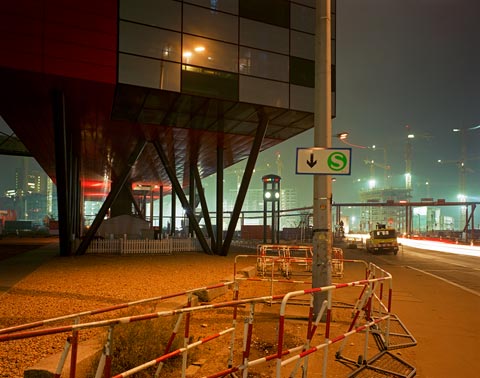
Under the InfoBox, 1999 (4×5 film)
This lack of focus and scatter-shot approach to disseminating information is, of course, evidence of the chaos created by competing agendas, financial interests, and governmental agencies plagueing the whole project. But despite all of that, it would seem possible for the city, state, Port Authority, and Larry Silverstein, to come together to create an Infobox-like center on the site. There is more than enough space for such an elevated temporary structure. Even as the 9/11 memorial takes shape, it will be years before the spiral of buildings that loosely follow the original Libeskind plan will be completed. During that construction period, millions of tourists from around the world need to be accomodated. Ultimately, an information center/observation deck would do more than that. It would help demonstrate that the city is looking to the future with confidence in the wake of the attacks on 9/11.
